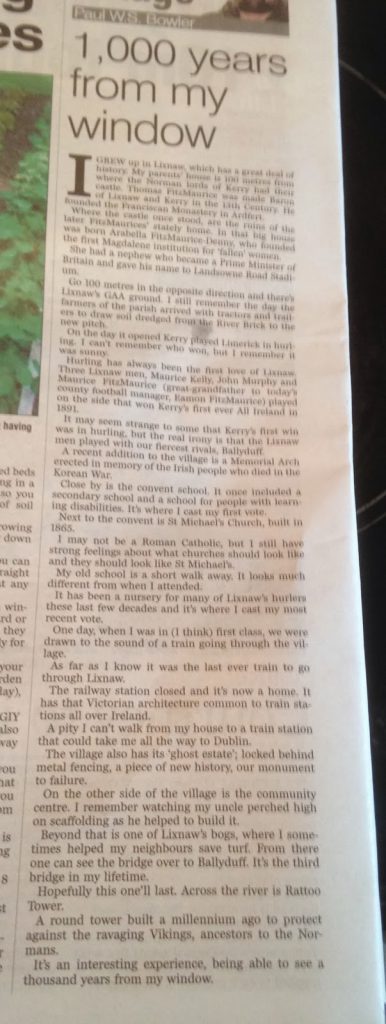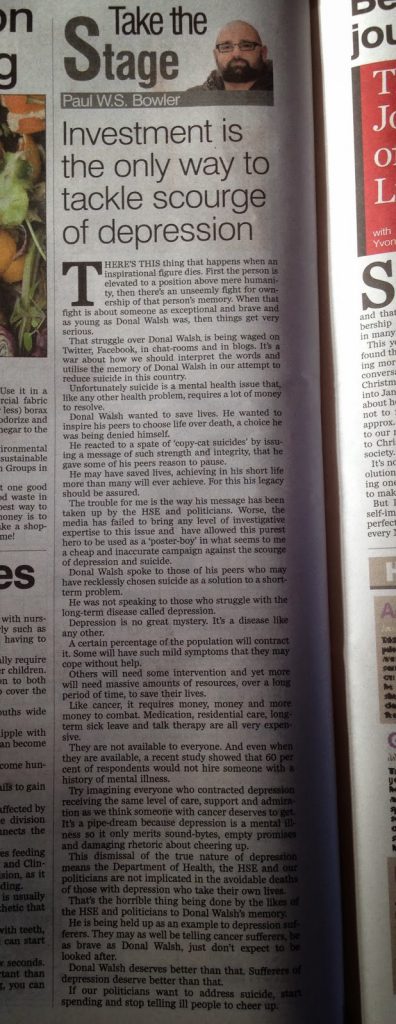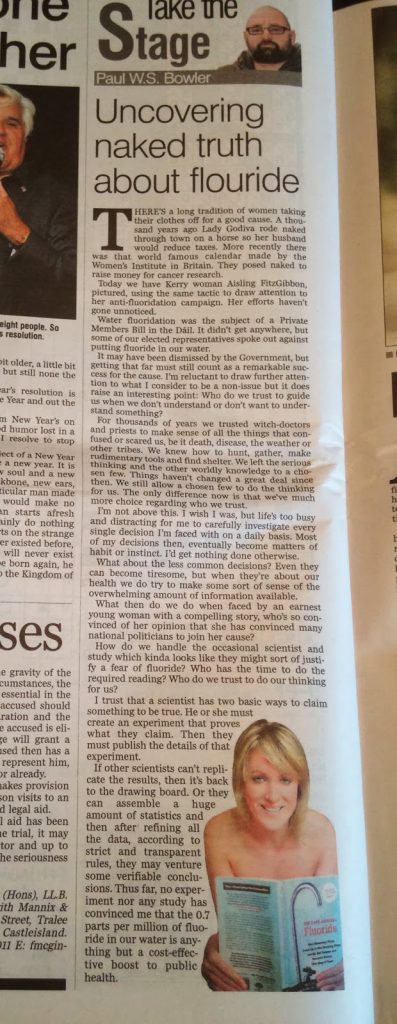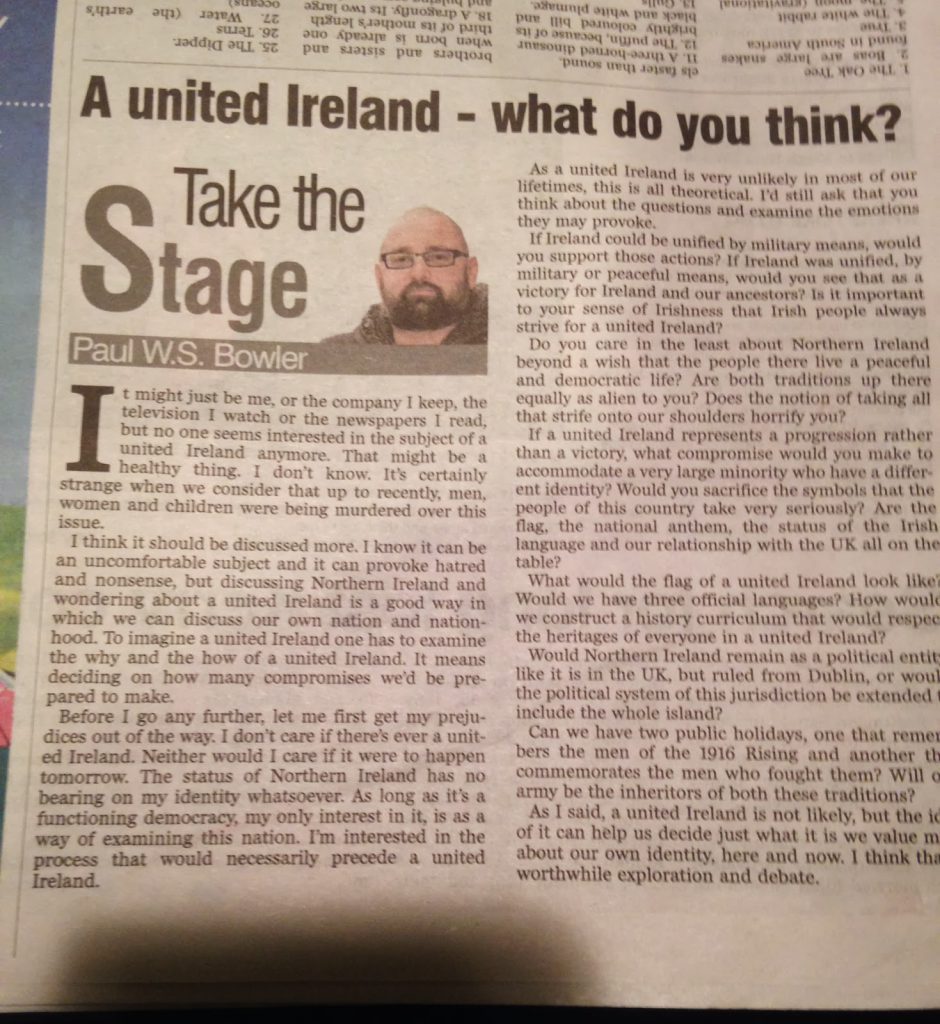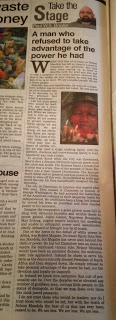If the anti-fluoride people had come to me and argued that forced mass medication is a heinous imposition, I would have signed up immediately. Especially if they had used words like ‘heinous’ and ‘imposition.’ If they’d then gone on to use the word ‘Orwellian’ I’d now be flogging a calendar featuring my big bare belly and a very small fig leaf. Yes, fluoride made my willy tiny.
I’m big on saying no to being told what to do by those who have the power to tell me what to do. It’s rational to be suspicious of power. Look at what the powerful do with power, the bad bastards that they are. Of course if I’m being really reasonable I’d have to admit that I don’t like people with power because of my conflictual relationship with my father. But as I won’t accept anyone as having the power to deny me the right to base my entire belief structure on unresolved oedipal issues, I shall continue as is.
Perhaps that’s why I think that the day after the scientists prove the existence of a god, they should begin working on a way to kill it. I will still be an atheist the day after the scientists prove the existence of a god. Facts should not get in the way of a dearly held prejudice. The nation-state would fall with such clarity.
So I am, possibly, pathological in my dislike of authority. It led me to support, in principle, the referendums on Dáil Committees and judicial pay, but to vote against them because the wording was a bit too vague in the whole curtailing the power of mediocre teachers department. It’s why I’m in Fine Gael. I don’t particularly like the party, but they annoy me less than the others and no fucking way I’m not having at least a minor say in the laws that oppress, I mean, affect me.
I really should be on the side of the anti-fluoride people. No father I will not eat my greens. Yes father I accept that they may indeed be good for me, that they are rich in vitamins, minerals and fibre. And that they form the basis of any good diet. But father I simply will not be told. No father I will not go to my room, I am 39.
I’m not on the side of the anti-fluoride people simply because the enemy of atheism and secularism is not supernaturalism (well not today at least). The real enemy is woo. Not because woo is wrong. I’m a capitalist for Gandalf’s sake, I believe in all kinds of wrong stuff. If woo were simply and merely wrong, then I could politely file wooists under people who are weird but harmless, like pagans, Garth Brooks’ fans and people who don’t like Lord of the Rings.
The anti-fluoride woo is dangerous. Not dangerous in the sense that if they convince our mediocre teachers to stop adding fluoride to our water, people might die. Poorer children may suffer a deterioration in dental heath, but poor people don’t tend to matter to wooists. Wooism is very much a middle-class disease.
The danger is that reason and science will have been discounted in a major public policy decision. Nonsense populism will have won the day. Even if our mediocre teachers then decided to add fluoride to milk and salt like our European neighbours, the anti-fluoride crowd will, with inflated egos and undeserved credibility, begin looking for the next idiocy to champion.
I don’t want to suggest that the anti-fluoride brigade are as woo wrong as the homeopaths, the chemtrail weirdos, the disgraced anti-vaxers, angel healers, the Elvis is still alive, kidnapped by an alien, tin-foil hat wearing loons that inhabit the Conspiracy Theory hell-pits of the internet. I really don’t want to imply that at all. But according to Neuro-linguistic programming, just putting them all in the same paragraph is sufficient to suggest that they are all in fact, up their own fundaments, speaking through their fundaments and/or are a bunch of fundaments.
I’m not on the side of the anti-fluoride people because they represent a regression, an evolutionary cul-de-sac, an idiocracy that threatens lives. This country already has a positive surfeit of native stupidity to contend with. We use Sellotape to mis-teach teenagers about sex and I can’t be the President because I’m an atheist. That’s the only reason under the sun, that I can’t be President. Not a single thing else would stand in my way. And our bankruptcy system can trap individuals for up to eight years. Yes, I said eight years. Yeah my party brought that in. Eight fucking years. Mediocre teachers every one of them.
Then there’s our deference to authority and our lack of respect for authority. Often a dichotomy contained in the same person. What’s that about? I won’t compare the wooists to the Barbarians at Rome’s gates or the Ottomans standing before at Venice. Those would be overly dramatic references. More showing off really and possibly saying more about me than the wooists. (The allusion I’m aiming for here is floodgates. I think it works. Comments on a postcard please…)
If we allow the wooists a victory, even an empty and relatively unimportant one as this, then we may as well begin handing out the tinfoil hats now, for the idiocracy will be in the ascendancy. (That’s an astrology allusion by the way. You’re welcome) Our politicians will have surrendered to a populism so dumb and scary that a Conspiracy Theorist would think that our mediocre teachers are simply following the mob where ever it may take them, even if it’s down the rabbit hole, or up a conspiracy theorist’s fundament just to stay in power. Not realising that mediocre teachers are just that dumb.
(Just a few links to the fight against woo)
One, Two, Three, Four, Five, Six, Seven, Eight, Nine, Ten and Eleven

